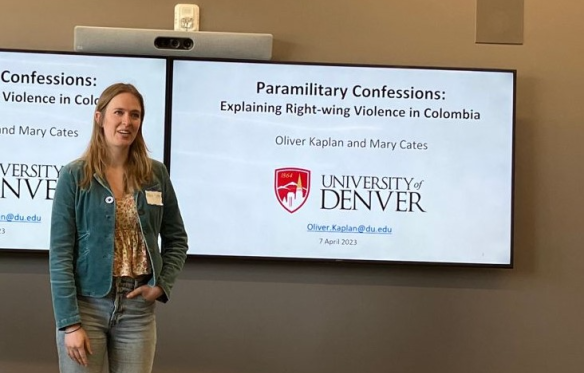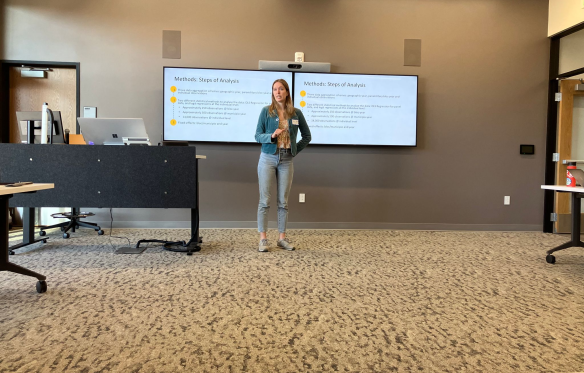Korbel student strengthens public speaking skills while advancing on career journey
For many people, class presentations are some of the most nerve-racking days of the quarter. It’s a day that typically comes with no alternative, no opt-out, in a sense, the grade for the class is often predicated on that. The grade is an incentive, in a sense, meant to prompt the practice of the invaluable skill that is public speaking.
But take that incentive away and many people wouldn’t consider getting up in front of their peers, and fewer yet would have the ability to transform it into something fun. But that’s what Mary Louise Cates did– except not in front of her familiar peers of graduate students, but instead in front of a collection of academics, all of whom were leaders in their field, and many of whom had questions, not rhetorical questions, but specific questions directed at her and the research she presented on.
Let’s rewind a bit– who is Mary Louise Cates? Born and raised in Missoula, a city in the mountains of western Montana, she wasn’t quite ready to go to college right after high school. So, for the year between high school and college, she lived in France, only to come back to Montana State University and pursue a degree in French, as well as Spanish.
Her year in France wasn’t enough to squash the travel bug. As any of us who have had a taste of international travel know, it isn’t an easy bug to squash. “I came out of college wondering what I could do with the degree,” she told me, “So, after college, I spent two years in Spain teaching English and getting a master’s degree in human rights in Granada.”
It was the classes in Granada where she first began to take a deeper look at peacebuilding, especially in Colombia. “Colombia is such a cool example of how the state can promote peacebuilding,” Cates told me, “So, my interest in the region has always been from a peace angle.” It wasn’t only the fact that Colombia is a good case study though, in Granada, Cates became friends with a lot of students from Colombia. “They were just the most fun,” she said, “It gave me a lot of exposure to Colombia and made me want to visit and learn more about the conflict and peacebuilding process there.”
That’s exactly what she did. After coming back to the U.S., Cates and her fiancé moved to Denver. After a while teaching Spanish, then a stint in customer relations at a tech company, she began thinking about going back to school for her second master’s degree. “I was already in Denver and learned about the Korbel school,” she said, “I was impressed by all the career services and thought it would be really helpful.”
Cates is a second year now, about to graduate with a master’s degree in International Development, and after reflecting on her previous two years she pointed to one thing in particular that was helpful– getting the funding for an internship down in Colombia. “That scholarship,” she said, “Covered my room and board while in Colombia, which made it possible for me to keep my apartment here in Denver. That experience shaped my time here at Korbel.”
Finding that internship was in no small part aided by her connection with Dr. Oliver Kaplan, a professor of human rights and civilian protection issues at Korbel, and someone Cates has been working with as a researcher since coming to the school. “I was looking for an internship that had to do with evaluation,” she told me, “And he knew of a survey firm in Bogotá, Colombia.” She interviewed for the position and was asked to fly down to the city to work as an intern there. “I was surprised,” she said, “Because it was so in line with what I want to do. I wasn’t involved with the logistics, but I worked in the office in data visualization and writing the data reports for the firm.”
After coming back to the U.S., Cates continued to work with Dr. Kaplan on his research studying the motivations behind paramilitary violence in Colombia. “I didn’t know very much about paramilitaries before starting to work with Dr. Kaplan,” Cates told me, “It was a great opportunity to learn more about that actor in the conflict.”
When Cates enrolled in Korbel, she came with a specific goal in mind. “I wanted to present at a conference,” she told me, “And an opportunity presented itself.” That opportunity was the Four Corners Conflict Network (4CCN) conference that took place in Moab this past April, and it seemed like the perfect place to give a presentation for the research she and Dr. Kaplan had been conducting on the motivations behind paramilitary violence in Colombia and the integration of ex-combatants.
In preparation for the conference, she practiced a lot– with Dr. Kaplan, with her research team, and with her fiancé. “I practiced that presentation backward and forwards,” she said, “And by the time I got up there to present, I felt very confident and had some fun with it.”
There were about 30 people at her presentation. “The most intimidating part,” Cates says, “Was the question-and-answer section.” There was a discussant who had sent her the critiques they had beforehand so Cates could prepare responses, but as for the questions coming from the audience, she didn’t quite know what they would be asking. “So, Dr. Kaplan coached me, and I had a phrase in the back of my head just in case someone asked a question I didn’t know the answer to.”
Cates hopes to publish a paper based on their research. Dr. Kaplan and the rest of the research team are excited to see where their research leads. After this quarter, Cates will be graduating and is hoping to stay in Denver for a while. “I love research, I’d like a position where I can use some of the research skills I’ve developed while in Granada and at Korbel.” Having lived around the world, knowing multiple languages, and holding two graduate degrees, Cates has one thing on her mind moving forward, “I just want a job where I can continue learning things.”
This article was written by Korbel Graduate Student David Kelm




